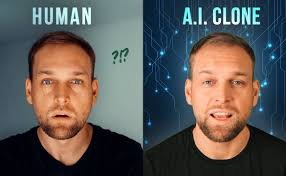Step aside, wax figures! In 2025, the world of celebrity endorsements, entertainment, and even personal branding is being revolutionized by something far more dynamic: Celebrity AI clones and digital doubles. This isn't just science fiction anymore; it's a rapidly evolving reality, with A-listers and major brands leveraging cutting-edge artificial intelligence to create hyper-realistic virtual versions of famous faces.
But who's actually stepping into this brave new world? And what does it mean for the future of fame and content creation? Let's peel back the layers and discover which stars are embracing their AI counterparts and why.
The “Why”: The Allure of Celebrity AI Clones and Doubles
Why would a celebrity, already commanding immense real-world presence, opt for a digital twin? The reasons are as varied as the stars themselves:
- Ubiquitous Presence: An AI clone can be in multiple places at once. Imagine a celebrity appearing in a commercial in New York, a virtual reality experience in Tokyo, and a personalized message for a fan in London – all simultaneously, without a single plane ticket. This is an example of the term- Celebrity AI Clones. This offers unparalleled scalability for endorsements and appearances.
- Time and Efficiency: Filming commercials, attending events, and creating content are incredibly time-consuming. A digital double can take on these tasks, freeing up the human celebrity for other projects, rest, or personal time. This means more content, less burnout.
- “De-Aging” and Legacy: For actors, particularly, Celebrity AI clones offer the ability to de-age or even “resurrect” them for future projects. We've already seen instances of this with the voice of James Earl Jones allowing Darth Vader to live on, and discussions around “resurrecting” deceased stars for new campaigns. This ensures a celebrity's legacy can continue indefinitely.
- Creative Control and Customization: Brands can have precise control over an AI clone's performance, dialogue, and even appearance, tailoring content perfectly to specific campaigns or audiences. An AI version can speak multiple languages flawlessly, wear different outfits, and even generate unique expressions without scheduling reshoots.
- Reduced Risk of Scandal: Unlike human celebrities, AI digital doubles don't get embroiled in controversies, make gaffes, or have personal issues. This offers brands a highly reliable and brand-safe ambassador.
- Monetization of Likeness: For the celebrities themselves, licensing their digital double provides a new, potentially lucrative revenue stream for their intellectual property.
Who's Stepping into the AI Mirror in 2025?
While the legal and ethical frameworks around AI clones are still evolving (thanks in part to the SAG-AFTRA strikes of 2023, which secured important AI protections for performers), several prominent figures and industries are already deep into the world of digital duplication.
1. The Legacy Legends: Ensuring Immortal Icons
This is perhaps the most ethically complex but actively developing area. For iconic figures, AI clones offer a way to preserve or even extend their artistic contributions.
Voice Actors (e.g., James Earl Jones): As mentioned, James Earl Jones granted Disney permission to use AI voice cloning to ensure Darth Vader's iconic voice can continue in future Star Wars projects. This is a prime example of a proactive decision to preserve a character's authenticity.
Deceased Celebrities (with estate consent): While highly controversial, the technology exists to “resurrect” deceased stars. Spanish beer brand Cruzcampo used deepfake technology to “bring back” late singer Lola Flores for a commercial. In 2025, with clearer legal agreements, estates of figures like Marilyn Monroe or Prince might explore limited, carefully managed uses of digital replicas for approved projects or brand partnerships.
2. The Marketing Maestros: Brands Embracing Virtual Ambassadors
Beyond individual celebrities, brands are creating or licensing digital twins of models and influencers for their marketing campaigns, especially in fashion and retail.
- H&M and Digital Models: Fast-fashion giant H&M announced it had created digital twins of 30 real-life models to showcase clothing lines. These AI replicas can model new outfits and even interact in virtual showrooms, drastically reducing the need for costly photoshoots and accelerating content production.
- Luxury Brands: High-end fashion houses are experimenting with AI models and digital clones for virtual runways, exclusive digital campaigns, and AR try-ons. While not always directly cloned from specific celebrities, this shows the industry's broader move towards virtual representation.
3. The Gaming Gurus: Enhancing Immersive Experiences
The gaming industry has long used digital doubles for characters, but the line is blurring with real-life celebrity integration.
- Athlete Avatars: Expect to see highly realistic AI clones of sports stars integrated more seamlessly into sports games and esports events. These aren't just motion-captured models; they can be infused with AI behaviors and even dynamic dialogue.
- “NPC” Celebrity Cameos: Imagine a beloved actor appearing as an AI-powered non-player character (NPC) in an open-world game, delivering unique, personalized dialogue based on player interaction. This enhances player immersion and creates novel gaming experiences.
4. The Content Creators: Influencers Multiplying Their Reach
The rise of accessible AI tools means it's not just the mega-rich celebrities exploring digital doubles. Social media influencers and content creators are also getting in on the action.
- AI Influencers vs. Celebrity Clones: It's important to distinguish between entirely AI-generated influencers (like Lil Miquela or Rozy) who don't have a human counterpart, and AI clones of real celebrities. However, the technology used is similar. In 2025, many human influencers are creating AI versions of themselves to:
- Generate additional content (e.g., answering FAQs 24/7).
- Appear in more brand collaborations without physical presence.
- Experiment with different personas or content styles.
- “Two-Self Economy”: Experts are calling this the beginning of a “two-self economy,” where a real human works alongside their virtual double to maximize output and reach.
The Ethical Tightrope Walk: Consent, Control, and Compensation
The proliferation of AI celebrity clones isn't without its challenges. The biggest ethical considerations revolve around:
- Consent: The SAG-AFTRA strikes highlighted the critical need for explicit, informed consent for the creation and use of digital replicas. This agreement dictates that performers must give written permission, and compensation must be fair.
- Ownership and Rights: Who owns the AI clone? The celebrity? The company that created the AI? New legal frameworks are being established to address intellectual property rights for digital likenesses.
- Misinformation and Deepfakes: The malicious use of AI clones to create deepfakes (fabricated videos or audio of a celebrity saying or doing things they never did) remains a serious concern, leading to demands for watermarking and verification systems.
- Authenticity and Trust: As AI clones become more realistic, audiences are demanding transparency. Knowing whether they're interacting with a real human or an AI model is becoming increasingly important for maintaining trust.
Conclusion: The Future is Blurry, But Full of Potential
In 2025, celebrity AI clones are no longer a futuristic concept; they are a tangible reality reshaping the entertainment industry, marketing, and digital media. From legendary actors preserving their voices for generations to come, to fashion brands creating endless virtual campaigns, and influencers multiplying their online presence, the applications are vast and growing.
While the ethical implications and the balance between human artistry and AI replication will continue to be debated, the trend is clear: digital doubles are here to stay. They offer unprecedented opportunities for scale, creativity, and monetization. As technology advances and legal frameworks mature, we can expect to see an even more seamless (and sometimes unsettling) integration of AI celebrity clones into our daily digital lives, forever blurring the lines between reality and simulation. The question isn't if your favorite celebrity will have an AI clone, but rather, how will they choose to use it?














